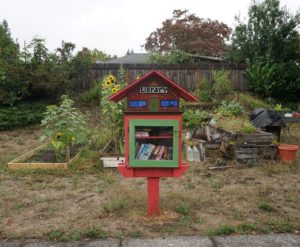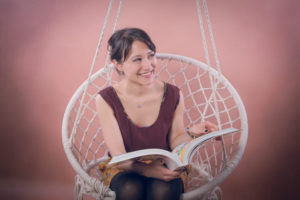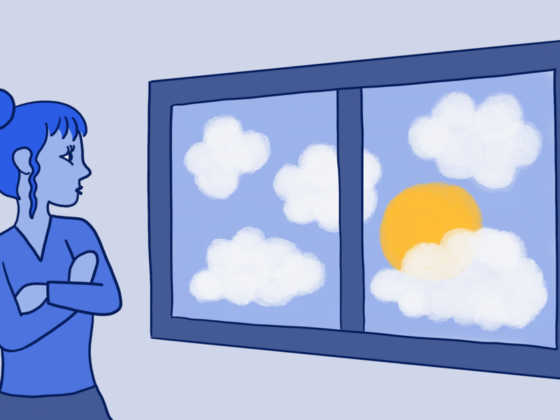As kids, my siblings and I had a subscription to the local library but, back then, I wasn’t a literature nerd. To take my pick, I’d flip through the books and rely on summaries, gut feelings, and covers. I was a lover of images. Drawing was my escape of choice.
At home, I’d draw for hours on end, inventing characters and stories around them. I was a bit of a classroom doodler, too – a habit that would later manifest itself in sporadic bursts: At off-peak times in the workplace, I’d draw around the paper holes of my notebook or redesign the corporate logo.
Yet words, and the spaces that contain them, have held a special place in my heart throughout my life. Reflecting upon the relationship I’ve developed with the written word, upon my journey as both receiver and transmitter of words, I realize, as some do when thinking of a love story, it was meant to be.
It was the literary spaces I was drawn to first, I think, rather than the books themselves. When we’d go to the hypermarket, I would stay in the book section while my mother would do the shopping. As an introvert prone to overstimulation, I’m invariably on the lookout for the quietest spots when I arrive at a place. It’s reassuring to know they’re there, should you need to hide for a little while, or catch your breath.
Then I grew to love the physicality of books, not just the shelter they provided. I loved both the freshly printed books and the weathered ones many have traveled with, and the idea of holding in my hands a tiny universe.
It’s not that I wanted to swap the real world for an imaginary world, it’s just that, through other human voices and eyes, I was trying to better understand the world around me. Just as a photographer steps back to have a more complete view of what they seek to capture, so too I was reaching for a realm outside the confines of my life. To me, still today, literary spaces represent both a safe haven from the real world and a doorway to it.
As a small, preliterate child, I’d write series of letters on my bedroom wall, nonwords only I could give meaning to. Later, I learned how to read and write, and wrote short, short stories (about a cat who aspired to be a principal dancer, about a snail who was sad he was born on February 29 because he could only celebrate his birthday every four years, about friends finding a treasure).
On a whim, after a yearlong language study vacation and two weeks before my first-ever day of university, I called the secretariat to say I wanted to study modern languages & literatures instead of information & communication – a change of mind I’ve never regretted.
I studied English and German. I’m more proficient in the former for I learned it well before the latter, and with greater passion.
English was all sounds to me at first. My mother would enroll my siblings and me for extracurricular activities, farm and multisports days, and the like. On a theme day, I socialized more with an Australian woman than with kids my age, and got bitten by the language learning bug. I was to learn English at school at a later time, but couldn’t wait. I tried to teach myself and, at some point, my mother gave me a Lonely Planet gift set for my birthday.
I loved listening to English-language songs, even though I didn’t quite know what the lyrics meant. I’d practice singing as fast as I could in my room. I’d play and replay tapes and CDs, read and reread dialogues to perfect my pronunciation, before coming to accept my accent. Isn’t it funny how we often wish to get rid of pieces of our identity only to want them back when we’re older? Or perhaps we simply don’t mind them anymore.
Today I write in English most of the time, although my first language is French, because I love the fact that English is so widely spoken and that it’s said to have one of the largest lexicons. Also, because that was a subject of my studies, English and literature seem to be inextricably linked in my head.
Living off campus, I’d read on the train commute. I enjoyed watching the changing scenery go by but, once I’d memorized the landscapes, was happy to disappear into a book for the entire ride. I can count on the fingers of one hand the number of times I’ve skipped class: It was fascinating to analyze other people’s writings. Yet it feels like I didn’t have much of a personal voice until the age of 24. That’s the moment I knew I’d be in it for the long haul.
The oft-made statement that reading and writing are solitary activities has much truth to it. Paradoxically, I have found no greater antidote to my loneliness than reading and writing.
You see, my whole life I’ve felt awkward in social settings. I don’t know how to hold myself, what to do with my limbs, how to show neither too much eagerness nor too little, how much speaking time is the right amount, what have you. When I’m to speak on the spot, language tends to fail me: My shyness has me either ramble on or remain silent, the words stuck in my throat. What I mean to say hardly ever comes out clearly.
Reading makes you feel a kinship with other human beings, even people from remote epochs or countries far away from your own. What a relief to know everyone else is not that different from you! Also, reading can help with wayfinding, accompanying you through the vicissitudes of life, changes big and small, moments by turns tragic and rapturous.
When I was about 10, I had to present a book in class. I chose Philip Pullman’s I Was a Rat! To my surprise, it sparked much enthusiasm among my classmates. That might be the first time I saw how reading can help us connect not only with ourselves but with other people as well. And there was something oh-so delightful about it!
As for writing, it allows you to put more time and thought into words, to process your emotions, to rephrase or erase a sentence if need be. With nobody to evaluate your demeanor, your nervous habits, and so forth, it gives you a sense of freedom and confidence you may lack in public. And so the painful inarticulation lessens.
Writing helps me restore balance, in a way. While I’m an old soul, I have a distinctive childlike voice, and childlike mannerisms, or so I’ve been told several times. This apparent fragility I compensate for by a certain forcefulness in my writing.
Sure, writing becomes public-facing work the moment you share it, and has you expose yourself to rejection then, but I’d like to think you get the gift of preparation first.
Le Petit Prince by Antoine de Saint-Exupéry is, by far, one of my all-time favorite books. Gregory McDonald’s The Brave is the first book that had me rage inside. Many other stories have left a mark and, needless to say, a piece of writing about contentment and gratitude can be powerful, too. Some writers, like the late Mary Oliver, remind us we don’t have to be unhappy to write beautifully and touch hearts.
I turned to books to find answers only to realize asking good questions is more important. That’s what I’ve intended to do via this website: give food for thought and have you leave with hopefully good questions in tow. When I look at my blog posts, I see what I could have done differently to make them less flawed, but I try to remember I’m just practicing really. Sharing my writing with anyone was a terrifying prospect, but that’s taught me a thing or two. You won’t come across a very personal post by me by scrolling through your social media feed. Showing vulnerability in a blog feels more comfortable though, because I tell myself the person made a conscious decision to click on the post and sit down to read it.
I believe there’s value in leaving any preciousness or snobbery at the door or leaving the door open, because who knows what a read will teach us? If you sat next to me on the bus, you could find me reading an undemanding, lowbrow book one day, and an esoteric, dictionary-sized book the very next day.
And who knows what the ordinary will teach us? Anything can feed our inspiration and serve as material for the blank canvas which is the page, if we let it: an intriguing detail in a stranger; bits of conversations we overheard or took part in; scenes witnessed in the street; a mood captured in a painting; a scent evoking a memory… That’s another reason why I write: I want not to forget seemingly irrelevant details that would otherwise have gone unnoticed. I want to live in wonder and with acute awareness.
In fact, in terms of fiction, the kind of pieces I gravitate towards tend to portray everyday life and make it gripping. I like authors who write about something quotidian and specific and enhance it to touch on something deeper and more abstract. In terms of non-fiction, I enjoy essays that make me pause and encourage me to begin life anew or go about it in a different way, and opinion pieces that combine humor with critical thinking and convey a striking message without sounding preachy. Then again, I read as much as I can: diaries; memoirs; personal narratives; correspondences; writings on psychology, philosophy, culture; novels; poems; short stories; literary fiction; experimental books that don’t fit into a particular genre, etc.
Ideas are like unannounced visitors that turn out to be pleasant and colorful. I have pages and pages abounding with them, the result of years of observations and jottings – or rather compulsive note-taking. More than once, for want of a better alternative, I’ve written on the move, on the back of envelopes, the carboard part of notebooks, the margins of overfilled pages. I don’t know yet what will become of these fragments but I trust they will find their place in a story. I look forward to trying and patchworking into a coherent whole the disparate ideas that have accumulated. So, though I plan to write one more blog post by end 2021, from now on, I’ll work on the ‘creative work’ section of this website, and try to come up with fiction stories, perhaps even prose poems.
Now, if you’ll excuse me, I have a 3-A4 page long reading list to work through, and puzzles to form out of scraps of writing. If you need me, you’ll find me by the shelf in the corner, nestling among books, a pen within reach (-:
—
How about you? How did you fall in love with reading? What do you like most about writing? Please don’t hesitate to leave a comment below






Ah, Surya, so lovely to read your words – and hear your voice – again 🙂 I curled up with a hot drink and drank in your sharing (yes, it’s a Scottish summer and we got two hours of warmth earlier!). Your writing is always so honest and heartfelt and intriguing. And it’s a treat to hear the different parts of you.
I read all the time as a youngster – no classics, just lots of Enid Blyton (Famous Five, Secret Seven, Lake/River/Mountain etc adventures), school stories (Mallory Towers and St. Clare’s) and teenage crime solvers (Nancy Drew, Hardy Boys). All of this ruined my eyesight as I used to read under the covers! But I loved losing myself in those worlds. Sadly reading recently has tended to be about text books. I look forward to the freedom to read more widely and for entertainment. My writing now is a way to capture my feelings or draw some connection that feels important. What’s in my head feels so much richer than what lands on the page. It just doesn’t translate the way I hope. Like I wish I could take photos with my eyes because a photograph very rarely does the scene justice. Maybe I should just feel lucky to be able to enjoy the layers and textures of both for myself?!
I look forward to your creative work, though I hope the blog won’t be lost altogether. Whatever you write, in whatever form, it’s always precious. Just like those scraps….